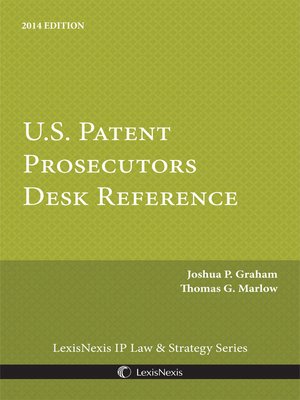
Sign up to save your library
With an OverDrive account, you can save your favorite libraries for at-a-glance information about availability. Find out more about OverDrive accounts.
Find this title in Libby, the library reading app by OverDrive.



Search for a digital library with this title
Title found at these libraries:
| Library Name | Distance |
|---|---|
| Loading... |
U.S. Patent Prosecutor's Desk Reference (2014 Edition), by Joshua P. Graham & Thomas G. Marlow. Patent prosecution is more than drafting patents—it is also advocating patentability. The challenge that each patent prosecutor be an effective draftsman and advocate is compounded by mounting pressure to procure high quality patents at minimum cost. There is a need for a quick, reliable reference to assist prosecutors in creating, researching, and supporting patentability arguments. Graham and Marlow provide a comprehensive and updated source of law, organized by sections corresponding to the types of rejections made by the USPTO. Each section of this reference work includes the basis for the rejection, responses to the rejection, and legal authority supporting the responses. This desk reference cites five different authority sources: statutes that govern the granting of patents; the Manual of Patent Examining Procedure, which dictates how examiners determine whether a patent application should be allowed; decisions by the Patent Trial and Appeal Board (PTAB), which is the administrative body of the U.S. Patent and Trademark Office that reviews decisions made by the examiners (formerly known as the Board of Patent Appeals and Interferences or BPAI); the U.S. Court of Customs and Patent Appeals, which was the body that reviewed decisions made by the Board of Patent Appeals and Interferences until the Federal Circuit came into existence in 1982; the U.S. Court of Appeals for the Federal Circuit, which reviews decisions made by the Board of Patent Appeals and Interferences. The 2014 Edition includes all cases from the Federal Circuit and Board of Patent Appeals through December 31, 2013, and has been expanded to include selected opinions of the United States Supreme Court and statutes as amended by the America Invents Act.







